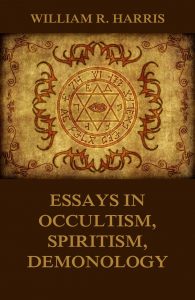Essays In Occultism, Spiritism, Demonology – William R. Harris
As far back as history goes, at all times, in all lands, and among all peoples materializations of spirits have occurred. The spirit manifestations to-day are but a repetition of those which took place in pre-Christian times. The war and the publications of Sir Arthur Conan Doyle, Sir Oliver Lodge, W. J. Crawford, and Emile Boirac have given to Spiritism a popular vogue and impetus. By a singular coincidence books on Spiritism, published in Germany, France, and Italy have appeared almost simultaneously with English and American publications on this weird subject. Many of these have given a quasi-scientific endorsation to Spiritism, and have contributed official support to the current belief in the reality of Spiritistic phenomena. Catholic students of these phenomena have never doubted their reality. While admitting and conceding the impositions, frauds, trickery and deceptions of many professional mediums. Catholic psychologists and theologians, who for nearly two thousand years have investigated the subject, hold that materializations have always taken place and are occurring to-day, and that no theory of fraud or delusion can account for them.
Format: Paperback.
Essays In Occultism, Spiritism, Demonology.
ISBN: 9783849674014.
Available at amazon.com and other venues.
A definition of occultism (from wikipedia.com)
Occultism is the study of occult practices, including (but not limited to) magic, alchemy, extra-sensory perception, astrology, spiritualism, religion, and divination. Interpretation of occultism and its concepts can be found in the belief structures of philosophies and religions such as Gnosticism, Hermeticism, Kabbalah, Theosophy, Ancient Egyptian religion, Obeah, modern paganism, Eastern philosophy (including Indian philosophy), Western esotericism and Christian mysticism.
Goodrick-Clarke suggested that the varied forms of occultism share “a strong desire to reconcile the findings of modern natural science with a religious view that could restore man to a position of centrality and dignity in the universe”. From the 15th to 17th century, these ideas had a revival from about 1770 onwards, due to a renewed desire for mystery, an interest in the Middle Ages and a romantic “reaction to the rationalist Enlightenment”. Alchemy was common among important seventeenth-century scientists, such as Isaac Newton, and Gottfried Leibniz. Newton was even accused of introducing occult agencies into natural science when he postulated gravity as a force capable of acting over vast distances. “By the eighteenth century these unorthodox religious and philosophical concerns were well-defined as ‘occult’, inasmuch as they lay on the outermost fringe of accepted forms of knowledge and discourse”. They were, however, preserved by antiquarians and mystics.
(The text of the last section was taken from a Wikipedia entry and is available under the the Creative Commons Attribution-ShareAlike License.)
Publisher’s Note: This book is printed and distributed by Createspace a DBA of On-Demand Publishing LLC and is typically not available anywhere else than in stores owned and operated by Amazon or Createspace.

